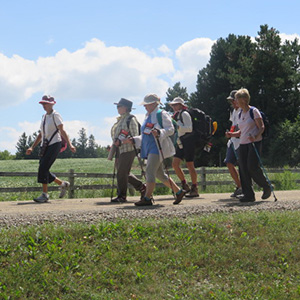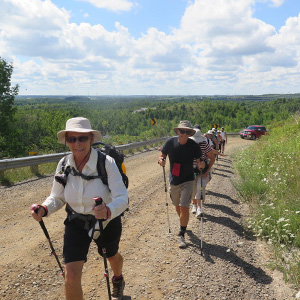
Join us as we cast off routine for eight days. Participate for a day, two days, or the entire pilgrimage!
The number of pilgrims who can participate is limited, so register early!
Table of Contents
- When is the Pilgrimage?
- How Much Does It Cost?
- How Does the Pilgrimage Work?
- Contributions and Thanks
1. When is the Pilgrimage?
The Pilgrimage leaves from Loyola House the Saturday of the August long weekend. After 7 nights of camping, we arrive at the Martyrs’ Shrine in Midland the following Saturday around noon. See the Registration Form for the exact dates.
2. How Much Does it Cost?
- Complete 8-Day Pilgrimage (includes food and amenities): Adults aged 18+ – $400 | Youth up to 18 – $125
- Only interested in specific dates: $75 pp/day | $150 max per family/day
- Cancellation / Refund Policy: Email received prior to June 30 = 100% refund; July 1-20 = 80% refund; after July 20 = 0% refund
- Transportation back from Midland not included
Go to the registration page here.
Transportation – Transportation is surprisingly easy, and we have never left anyone in Midland yet. The following carpooling options are recommended:
- Option 1 – Ask family or a friend to come and collect you. They are welcome to stay for the closing Mass and lunch.
- Option 2 – While on the pilgrimage, make a connection with someone employing Option 1 or 3.
- Option 3 – Bring your own car and shuttle it daily from one camp location to the next (takes 60-90 minutes).
3. How Does the Pilgrimage Work?
Once having confirmed your place on the pilgrimage, make a list of personal items that will ensure your comfort and safety on the walk. See the Trip Planner webpage for details and checklist.
Community: We offer a communal experience. We share chores, keep to a schedule, eat together, and do group activities. Time for contemplation and quiet reflection is also built in. Be open to transformation and growth! Seeing the world at 4.5 kms an hour, over many kilometers, facilitates a kind of natural meditation. Sometimes the realizations that bubble up while walking long distances can be joyous, sometimes they may be difficult. Walkers should practice kindness and patience with fellow pilgrims. Virtually every pilgrim has moments of soaring elation and personal growth. Pilgrimages never fail to surprise!
Difficulty level: 20-28 km in a day is a significant distance for any walker, so training is essential. Start training as soon as possible with daily 1-2 hour walks, and a longer (3-5 hour) walk at least once a week. Build up to longer walks as your endurance increases. Pilgrimages are synonymous with blisters and aches, but training can help a lot, as can good footwear. Fitness is important, but you don’t have to be an athlete. If you can currently walk 1-2 hours without needing a rest break, you can work your way up to the pilgrim’s pace of 6-8 hours of walking each day. Training ahead of time is important!
Footwear: It is important to have comfortable footwear that is already broken in, offers support, and is not too heavy. Heavy boots will make for a long day. Good quality socks will help to reduce blisters too (e.g. Cool Max, Smart wool, Wright sock). Enjoy a fresh pair of dry socks at lunchtime. Your feet are critical so research what works best for your feet to avoid blisters. (e.g. Glide, talcum powder, Vaseline, hikers’ wool, etc.) Pack a first aid kit
Showers: pilgrimage is about simplicity, so be prepared to “rough it” a little. Monday is the only shower otherwise it is basin baths and Friday has a refreshing river so pack a bathing suit.
Food is prepared by the volunteers or donated by our generous sponsors. 6 am Breakfast/coffee/tea is set out for self-serve. Breaks (15min) water, fruit, and trail mix. Healthy lunches (1hr) are prepared and waiting for your arrival. Suppers are made and delivered by our generous sponsors who give of their time by providing food and preparing meals that nourish us on our journey. Please ensure dietary needs are clearly listed on your registration form.
Gear: Label your tent, chair, and bag, duct tape and a sharpie are great helpers. Pilgrims are responsible for setting up and packing up their camping gear daily. Keep your hockey/duffle bag less than 20kg. The committee members are all volunteers. Think of their backs as everything gets handled twice a day. Take everything you need for the day … NO access to gear stored on the truck until dinner. Remember that August nights can be cool.
During the walk, you will most likely develop sore, tired feet, maybe even a few blisters. This is part of the pilgrimage experience. Here are a few key things that make a successful pilgrimage:
- Pilgrims need to be able to walk at a pace of 4 to 4.5 km per hour depending on terrain for 20-28 km daily. Training and foot care are important.
- Consider gathering prayer petitions from friends, neighbours, and others for your pilgrimage. Petitions will be carried collectively and burned on the last day.
- Walk in silence: 30 minutes in the morning and the afternoon.
- For safety reasons it is critical that the group walks no more than 2 side by side, always staying on the shoulder of the road and that the gap between the front and end of the line is minimized.
- Review and be familiar with all safety rules that are part of the registration package. Safety is critical for a successful pilgrimage.
- Those who get injured, overheated, or tired, and are unable to keep up with the group’s pace can use the support vehicles to be shuttled up hills or to the next rest spot.
- Tired or sore feet for a day? Rest from walking and volunteer for the day.
This pilgrimage is not designed to provide you with a personal holiday. You are joining a temporary intentional community, not just walking. Negotiating differences, being patient with each other, and graciously meeting the challenges of inconveniences and discomforts are all a part of a pilgrim’s journey. Chores and helping each other are part of intentional community. It is about being generous with your talents to help others. The pilgrimage is organized and run by volunteers. Many hands make light work. We have all paid to participate and while some serve more time than others, everyone has an opportunity to serve along the way to help to make the event go more smoothly.
You are encouraged to help out where you can.
- Assist with meal preparation (means giving up some walking time)
- Loading and unloading bags and tents to and from the truck
- Setting up sun canopies for meals
- Setting up chairs for meals, closing them under the canopies for the night, or loading them into the truck
- Preparing Epson foot baths for when walkers arrive at the day’s destination
- Washing dishes
- Morning wake up: waking the pilgrims at 6 am
- Music
- Participate in the Daily Safety Detail: Rabbit, Monkey, Turtle
- Carrying the corss or petitions
- Be the Scheduler: gather pilgrims to start walking (4 times/day)
Day 1 Start from Ignatius Jesuit Centre

6:00 Meet at the 1st parking lot on the left as you enter the Ignatius college grounds. Go to registration table to collect your name tag and check in.
Drop the following off in the correct pile for loading onto the trucks
- Camp chair
- Tent
- Duffel Bag or hockey bag with your clothing, sleeping bag, pillow etc. (Absolutely no suitcases or garbage bags as they will not stack safely.) Max bag size: 24″x36″x15″; max bag weight: 20 kg.
Keep with you whatever you need for the day: full water bottle, sunscreen, bug spray, band aids, hat, backpack or fanny pack, etc.
Make your way to Loyola House with your family if they would like to attend the 7 am Mass with you.
Cars can remain parked for the week in this parking lot.
A “typical” walking day
- Walk at a pace of 4.0 to 4.5 km/hour. Total distance – approximately 20-28 km daily
- 6 am – wake-up, pack up tents, and possibly start breakfast
- 7 am – Mass
- 7:30 am – breakfast, finish packing up & help loading trucks
- 8:15 am – spiritual input
- 8:30 am – begin walking
- 10:15 am – having travelled 5-7 km: 15-minute break and snack/water replenish
- 12 noon – having travelled another 5-7 km: 1-hour lunch, Porta-Potties available
- 2:30 pm – having travelled another 5-7 km: 15-minute break and snack/water replenish
- 4 pm – having travelled another 5-7 km: arrive at the destination to set up tent
- 6 pm – supper followed by dishes
- 7 pm – spiritual group sharing
- 10 pm – quiet time
Dates & lodging
- Day 1 – 20 km – camping at St. Peter’s Church grounds in Oustic
- Day 2 – 28 km – camping on private property, Caledon
- Day 3 – 22 km – camping at Valley of Mother of God Monastery
- Day 4 – 25 km – camping at Immaculate Conception Church grounds, Alliston
- Day 5 – 28 km – camping at Tiffin Conservation Area (Rainbow Valley Rd.)
- Day 6 – 26 km – camping at St. Patrick Church, Phelpston
- Day 7 – 27 km – camping at St. Ignace II (1645 Rosemount Rd., Waubaushene)
- Day 8 – 17 km – arrive at Martyrs’ Shrine in Midland
- Note – locations are subject to change
4. Contributions and Thanks
The organizers of the Walking Pilgrimage are most grateful to:
- Zehrs, Loyola House, local parishes, CWL groups, and Knights of Columbus members who give of their time by providing food and preparing meals that nourish us on our journey.
- Our gracious hosts who welcome us so warmly on our journey.
God bless them all!